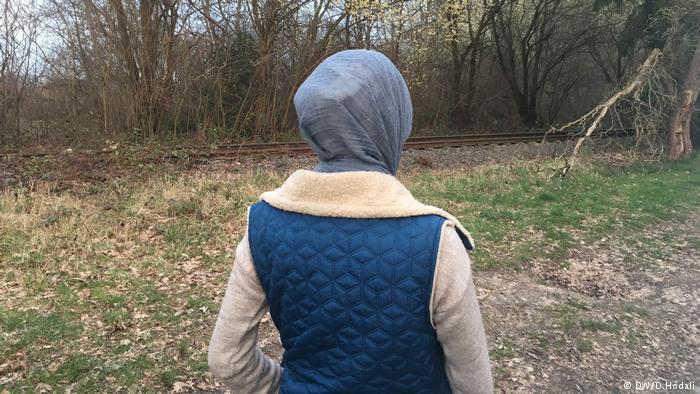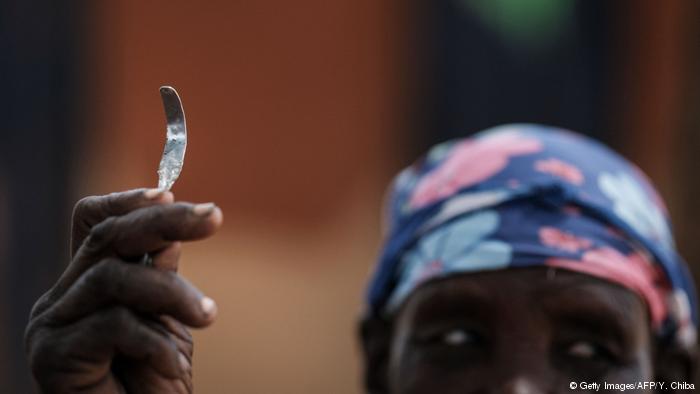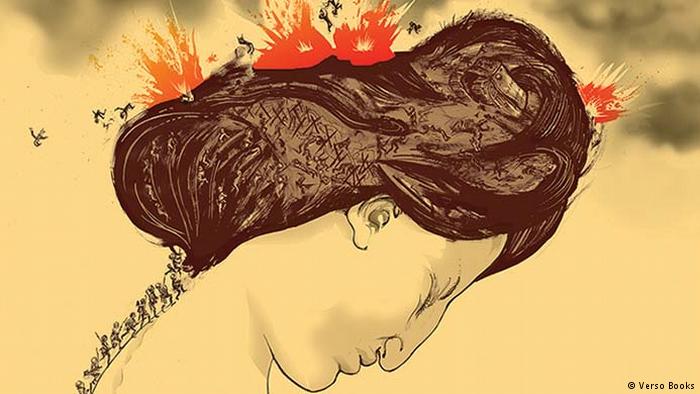Aleppo: ‘I’ve said goodbye to my family forever’

They were a happy family – until the Syrian war arrived in Aleppo. Rima A. decided at that point to leave her loved ones and her homeland. Now she lives in Germany and and tells DW her memories of the war.
She is still thin. Rima A. has gained a little weight, but the effects of the war in Syria can still be seen on her after a year and a half in Germany. Rima smiles as she opens the door. It is a wide, open smile, almost carefree, but when she talks about her hometown Aleppo, her lightheartedness turned into sadness – almost as if you could see a film running in her eyes about everything she’s experienced.
She has almost forgotten that the Syrian war has entered its seventh year. “I have lost my sense of time. The war has already gone on forever,” the now 25-year-old woman says. “We always thought that it would quickly end. But now I know that I was naive.”
Rima A. sips her coffee. Her thin fingers clutch the the handle of the coffee cup, like she needs to hold on to something. Her parents have sent her coffee grounds through a friend, who like Rima arrived in Germany on an international study program for Syrians.
The smell reminds her of the days when she would sit with her parents and eat breakfast. “The coffee from Aleppo has a nice, intense aroma. So many of my memories are coming back to me. I don’t drink from these grounds every day, because I want them to last as long as possible. I won’t be getting another package of grounds as fast I got this one” she says.
Rima A. does not want to give her real name. Her parents and siblings still live in Aleppo and she fears that an article about her herself could threaten her family at home by the Assad regime. She is vague about describing herself in some areas. “I am far away and doing my master’s degree but yet am always thinking about my family” she says.

Rima is happy drinking her coffee from Aleppo
‘I have stopped eating bread’
While walking, she remembers how it all began – it was 2012 in Aleppo. The war had already been raging in parts of Syria for a year. “It was summer, hot, and it was during the month of Ramadan. Before I could even blink an eye, the war had arrived in Aleppo,” Rima says.
Her second year of studying at the University of Aleppo had begun. All of a sudden, all activities at the university stopped. Now tanks were rolling through the streets and demonstrators were seen as terrorists. The city was now in a state of emergency. Rima and her siblings wouldn’t dare leave the house for weeks. “We were so scared that we often slept in the hallway. There were so many moments in which I thought that we were going to die,” she said sadly. Suddenly eastern Aleppo was separated from the Western part of the city.
The eastern part was from then on controlled by opposition forces, and the western part, where Rima lived, was under control of Syrian president Bashar al-Assad’s troops. Daily life had become a risky affair. Rima’s parents would leave the house only to shop for groceries. On the outskirts of the western part, it was very dangerous, Rima remembers, and the prices were lower there. “Everything was scarce. Bread especially,” she says. “I could not bear that suddenly we could only eat bread that had sawdust in it. It was disgusting.” She then simply stopped eating bread.
Water and electricity were also in short supply. “During my entire childhood and adolescence, I only heard about the war in Palestine, Lebanon and Iraq. I always asked myself, how someone could live in such a way. Now I know how you get used to this state of things.” However, staying in Syria was out of the question for her. Not only was the military conflict a big reason, but the attitude of Aleppo’s residents had also changed negatively since division of the city, she says. There was either friend or enemy – for or against Assad.
From that point forward, she logged out of all social networks. “I could not stand the political discussions there and I also did not want to see the pictures of Syrians in Damascus partying while hunger and death dominated here in Aleppo,” she said.
Decision to leave the country
Rima looks back at her beautiful childhood. She grew up surrounded by her extended family. “I was always happy as a child. During my school days I wanted to be a journalist. But my father was against it,” she says. Why? “In Syria there was never a free press. I would never have been able to report in a balanced way.” Rima thereupon studied natural sciences, and even managed to complete her schooling during the war. It was not until she had organized her first trip abroad to Germany that her parents realized that she was stubborn about leaving the country.

The city of Aleppo has faced massive destruction
“My dad could not make it possible for me. I then organized the trip with help from my friend who speaks German,” she says. Her family was not very surprised that their daughter wanted out of the country. “My father said that he would let me go under one condition: I would not be allowed to come back.”
Her voice breaks up and she begins to cry: “I have said goodbye to my family forever. I don’t know if I can ever come back and if they are all still alive.”
‘I miss my family.’
She is thankful that she did not have to come like other Syrians over the Mediterranean sea. After a long trip to Beirut, she could fly out to Frankfurt because she had a visa for Germany. “I often have a bad conscience. So many Syrians have died on the way to Germany and so many talented friends in Aleppo are just hanging in there,” she says, holding back tears.
“After I left Aleppo, I almost felt as if I were empty inside,” she says. Photos of the destruction in Aleppo still haunt the young Syrian today. “I have to cope with this alone,” she says. “It always breaks my heart when I think about my sister and parents.”
After fierce fighting in December 2016, Aleppo is now completely in the hands of the Assad regime. A large section of the population in the almost destroyed eastern part have fled to the western side. The infrastructure is on the brink of collapse, Rima’s parents tell her over the messaging application “Whatsapp.”
People in Aleppo are tired of war and are now standing closer together. “This is a Syria that I am happy to remember. These people who didn’t care about what religion you have. But the war changed everything,” she adds.
“I have been here in Germany for a year and a half. I really miss my family, but I don’t want to go back to Syria,” she says decisively. Rima is striving to get a doctorate after completing her master’s.
She likes living in Germany and is eagerly learning the language. It’s barely 18 months since she’s been here, but her Arabic is mixed with German words. And she likes German cuisine – especially chicken stew.
Author: Diana Hodali
_____
WTO RECOMMENDS
Women grapple with Silicon Valley’s bro culture
Abuse towards women is rife in Silicon Valley’s macho culture. Meanwhile just 7 per cent of cash goes directly towards women-led startups based in the main US IT hub. So, why aren’t women a larger driving force in Tech? (From July 12, 2017)
No ‘safe’ asylum for female refugees in Europe
Female migrants coming to Europe are exposed to physical and sexual violence while living in cramped shelters with other refugees. But cultural prejudices and trauma make it difficult for them to talk about abuse. (From October 13, 2015)
Women Immigrants Battle Their Fears Of The Unknown
Winnipeg, Canada – it’s a new world, a new journey. But instead of becoming the exciting experience it ought to be, it ends up being more about fending off unwanted fears of the unknown. Every new immigrant to Canada has to live through the three stages of acculturation, which for most is not easy. First comes the thrill and joy of exploring a new land, then there are feelings of marginalisation and hostility towards the host country and finally comes acceptance. (From May 22, 2015)






